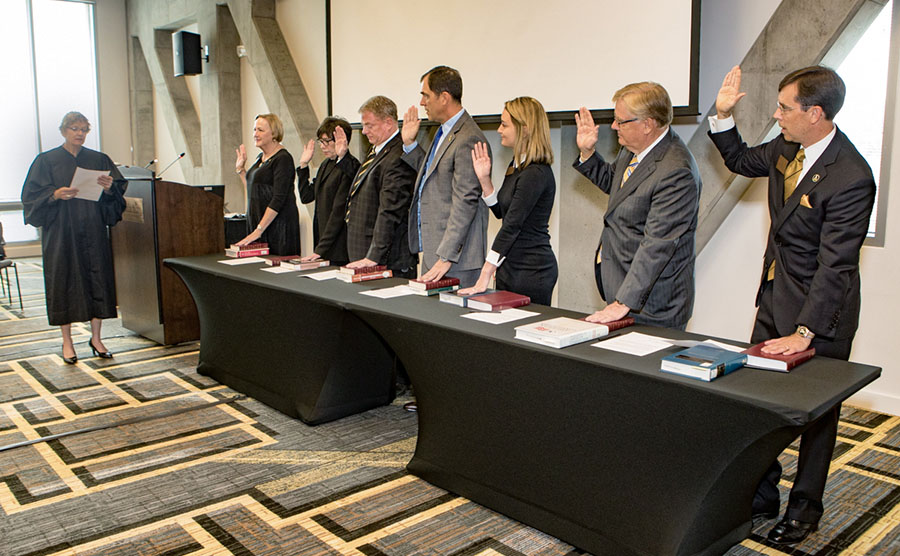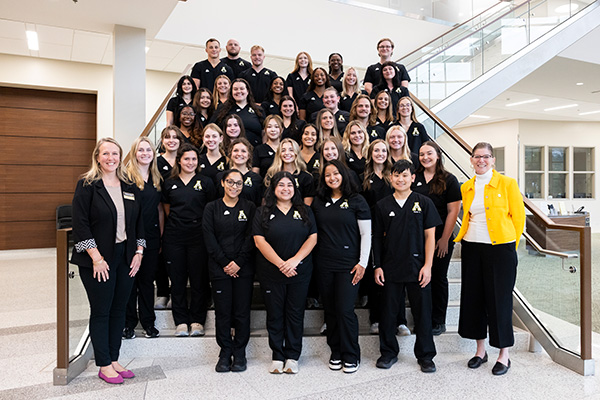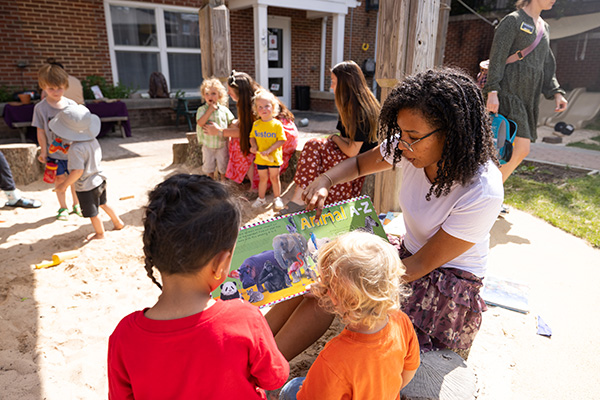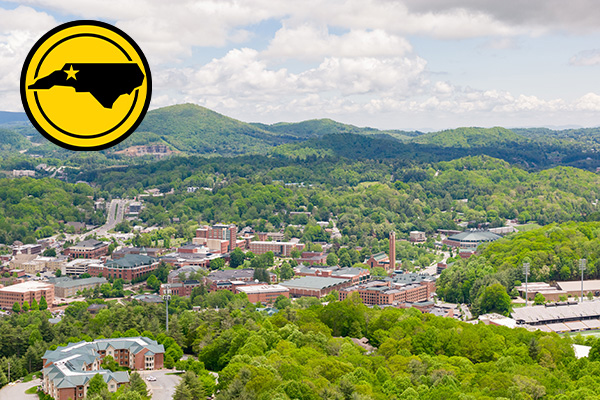
Seven individuals were sworn in as trustees of Appalachian State University at the Sept. 22 meeting of the Board of Trustees. They are, from left, Carole P. Wilson, Bonnie Schaefer, Charles V. Murray, Scott Lampe, Anderson Clayton, Donald C. Beaver and M. Lee Barnes Jr. Administering the oath of office was District Judge Rebecca Eggers-Gryder. Photo by Marie Freeman
BOONE, N.C.—New and reappointed members of Appalachian State University’s Board of Trustees were sworn in during the Sept. 22 board meeting, with James Barnes of Raleigh being named chair. Also during the meeting, Chancellor Sheri N. Everts shared enrollment data and the board approved a resolution making a regional wildflower the official flower of the university.
The Hon. Rebecca Eggers-Gryder of Boone, district court judge, administered the oath of office to seven trustees: Lee Barnes Jr. of Durham, Donald Beaver of Hickory, Anderson Clayton of Roxboro, Scott Lampe of Charlotte, Charles Murray of Winston Salem, Bonnie Schaefer of Blowing Rock, and Carole P. Wilson of Raleigh. Clayton is president of Appalachian’s Student Government Association.
The Board of Trustees approved the following officers for the coming year: James Barnes of Raleigh as chair, John Blackburn of Linville as vice chair, Susan Branch of Charlotte as secretary, and Dawn Antonucci of Boone, assistant secretary. These appointments became effective immediately.
In her remarks to the board, Everts stated, “Appalachian now has the largest and most diverse student body in history.” She continued, “In August, Appalachian welcomed 18,811 students to campus, including 3,306 first-year students who comprise the university’s largest and most diverse first-year class.”
Everts spoke of the importance of recruiting and retaining students and noted the university’s success in that regard. “Appalachian’s overall retention rate now exceeds 88 percent, which is an all-time high, and which also exceeds the national average of 68 percent,” she said.
Everts emphasized that Appalachian is widely recognized as a national leader in sustainability. She referred to the definition of sustainability offered by Dr. Lee Ball, Appalachian’s director of sustainability: “When everyone and everything, in any given situation, wins – that is sustainable.”
She offered examples of how this win-win approach is achieved at Appalachian. “If a student can resell a book so that it doesn’t go to the landfill, that is a win-win. If we support local farmers and provide our community with healthy food, that is a win-win. If we can diversify our campus population and nurture multicultural understanding and empathy, that is a win-win,” Everts said.
Everts also offered updates on four priorities she set last year:
- Communication
- The first priority was to improve and enhance communications. Locally, Everts said she and her leadership team have held more frequent and open meetings this past year. “Input from our faculty, staff and students and the community at large is critical for us to make informed decisions and to move together, as a community, with clear direction,” she said.
On a national level, faculty and staff, along with Everts, have provided information to U.S. Senate-level discussions of issues that affect the 13-state Appalachia region. “Over the course of four panel discussions, we provided insight and guidance to this task force, as they identified key problems confronting the region and approaches for tackling them, related to education and the workforce, entrepreneurialism and job creation, energy and infrastructure, and rural health.”
Everts reported that based on these discussions 19 solutions have been identified and will be used to engage governments at all levels and the private sector.
“Regular communications are also key to getting our stories out, and we have developed new mechanisms for doing this,” said Everts. “Last May, I began a weekly newsletter to keep our campus community informed. On a monthly basis, I send additional communications showcasing our community’s accomplishments to our campus, as well as to our university leadership, alumni, parents and families.”
- Efficiency and effectiveness
- Over the past year, her second priority was to increase campus efficiency and effectiveness and she talked about the continuing effort to identify the funding and physical resources needed to achieve this goal.
Everts noted that Appalachian was awarded a Gold rating from the Sustainability Tracking, Assessment & Rating System administered by the Association for the Advancement of Sustainability in Higher Education (AASHE). She stated that she is making the university’s Zero Waste initiative a priority for the upcoming year.
She spoke about importance of taking care of families of faculty and staff at Appalachian, asking “What could be more efficient and effective than solid support for our families?” Everts noted the importance of affordable child care and reported, “I have approved an architectural study to build new child care facilities on our campus that will more than double the number of spaces available.”
- Fundraising
- Everts’ third priority was continued fundraising. She said that Appalachian awarded undergraduate students $4.6 million in both need- and merit-based scholarships this year, but she said that more funds are needed. Additionally, the ongoing initiative to outfit the Beaver College of Health Sciences building, which she noted is on budget and on schedule to open in August 2018, has already garnered $1.1 million.
- Innovation
- Everts listed her fourth priority to “establish Appalachian innovation for transformational sustainability.” “Last spring, 40 proposals around transformational sustainability were submitted for first-time funding through the Appalachian Innovation Scholars Program. The allocated funds went to five research projects that reflect one or more of the university’s strategic initiatives,” she said. She also noted that all of the initiatives are related to campus planning for the new Innovation Campus, which will be built on the former site of the Broyhill Inn and Conference Center.
Everts mentioned her pride and appreciation for Appalachian’s outreach work in surrounding communities and Team Sunergy solar vehicle team, which took second place in the 2017 Formula Sun Grand Prix in July.
Everts’ full address to the board may be viewed at http://chancellor.appstate.edu/messages/id/138.
In other business, the Board of Trustees unanimously approved a resolution making the Black-eyed Susan perennial the official flower of Appalachian. The board also approved a recommendation to grant a Permanent Environmental Restoration Easement and Greenway Trail Easement to the Town of Boone for environmental restoration works.
The next meeting of Appalachian’s Board of Trustees will be held Dec. 7-8.
About Appalachian State University
As a premier public institution, Appalachian State University prepares students to lead purposeful lives. App State is one of 17 campuses in the University of North Carolina System, with a national reputation for innovative teaching and opening access to a high-quality, cost-effective education. The university enrolls more than 21,000 students, has a low student-to-faculty ratio and offers more than 150 undergraduate and 80 graduate majors at its Boone and Hickory campuses and through App State Online. Learn more at https://www.appstate.edu.
What do you think?
Share your feedback on this story.











